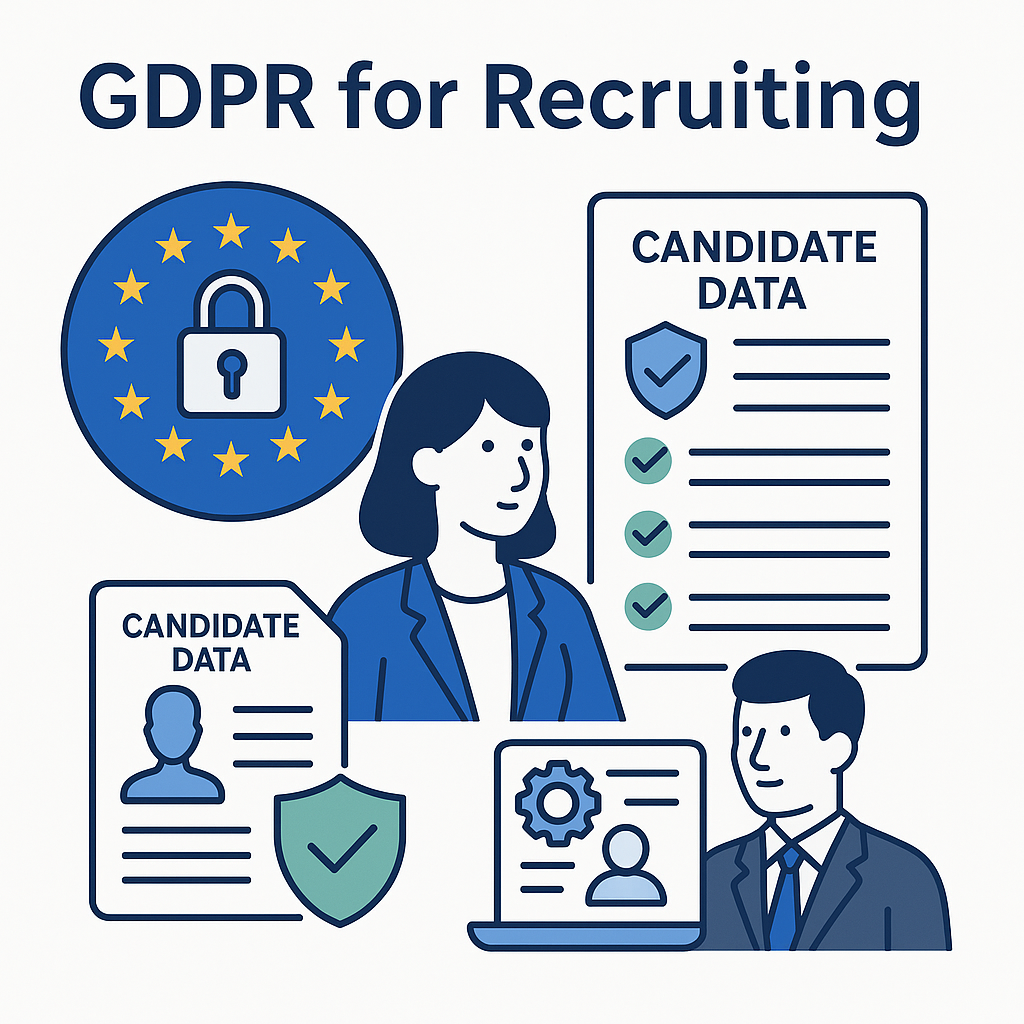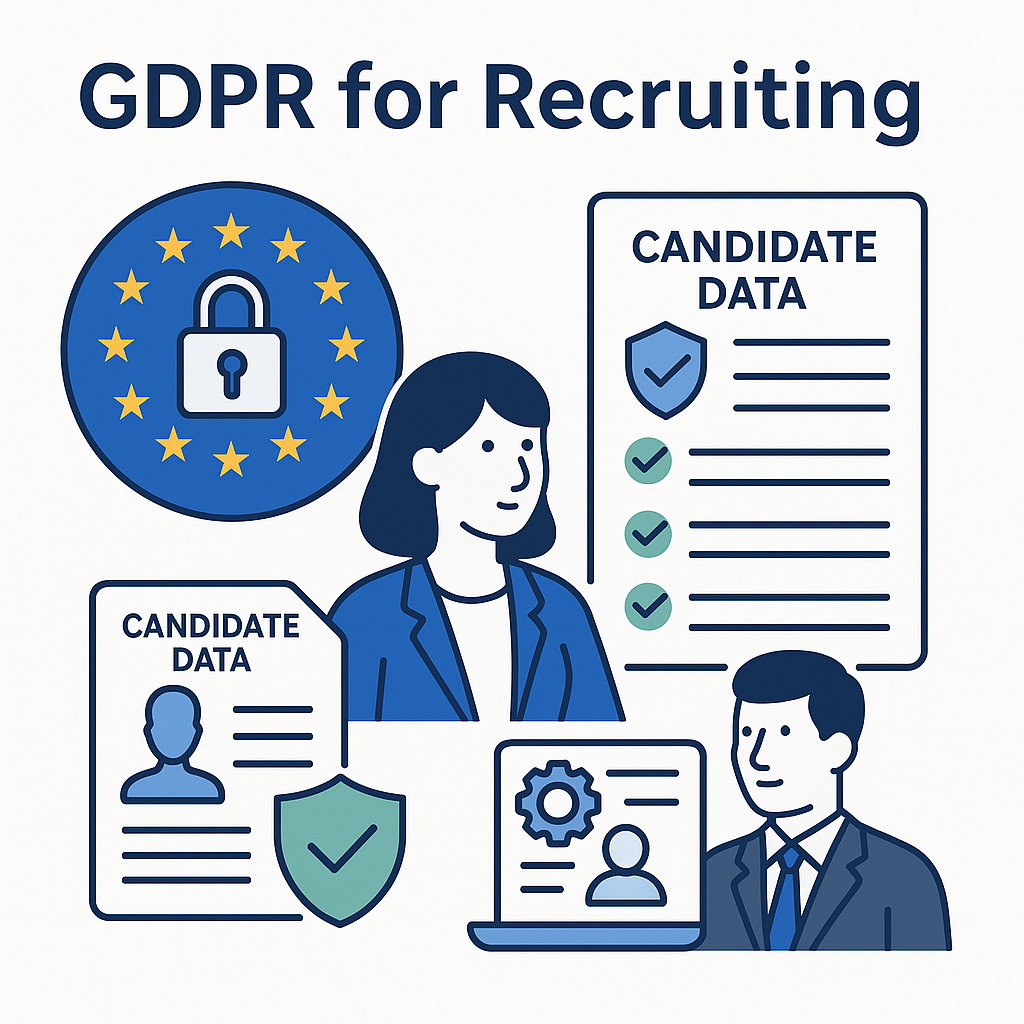GDPR for Recruiting: What Every Talent Team Needs to Know in 2025

In a world where data drives every decision—from sourcing candidates to AI resume screening—privacy isn’t optional, it’s essential.
The General Data Protection Regulation (GDPR) has reshaped how organizations collect, store, and use candidate data. For talent acquisition professionals, HR teams, and recruiters, understanding GDPR isn’t just about compliance—it’s about building trust and ethical hiring practices.
🔐 What is GDPR and Why It Matters in Recruitment?
The General Data Protection Regulation, enforced since May 2018 in the European Union (EU), governs how personal data is collected and processed. Candidate data—including resumes, interview notes, assessments, and even email conversations—falls under its scope.
If you’re hiring candidates within the EU or processing data of EU residents (even if your company is based elsewhere), GDPR applies to you.
📌 Key Principle: Candidates own their data. Organizations are merely custodians with specific obligations.
✅ 6 Core GDPR Principles for Recruiters
Lawful, Fair & Transparent Processing
Clearly inform candidates what data is collected, why, how it will be used, and who can access it.Purpose Limitation
Data must only be used for clearly stated recruitment purposes—not marketing or unrelated profiling.Data Minimization
Collect only what’s necessary—don’t overreach. If you're not using it to evaluate the candidate, don’t store it.Accuracy
Candidate data should be kept accurate and updated. Give candidates a way to edit or correct their information.Storage Limitation
Define how long you keep candidate data. Many companies follow a 6 to 12-month retention policy unless consent is renewed.Integrity & Confidentiality
Ensure security. This includes encrypted storage, access controls, and secure platforms (e.g., GDPR-compliant ATS like MokaHR).

🤖 What About AI and Automated Screening?
AI screening tools and smart matching systems fall under automated decision-making in GDPR. If a candidate is filtered solely by AI, they have the right to request human intervention or explanation of the decision.
Recruiters must:
Inform candidates if AI is used
Explain how it works (at a high level)
Allow candidates to opt-out or appeal decisions
✨ Tip: Make your AI explainable. Tools like MokaHR offer candidate-friendly matching transparency.
🌍 Cross-Border Hiring: GDPR Still Applies
Even if your HQ is in Singapore or San Francisco—if you hire European candidates, GDPR compliance is still mandatory. Consider implementing data processing agreements (DPAs) with vendors and ensure your HR tech stack is GDPR-aligned.
🧭 What Recruiters Should Do Now
Action | Description |
|---|---|
Audit your candidate data | Know where it’s stored, who accesses it, and how long it stays. |
Update your privacy policy | Make sure it includes recruitment-specific clauses. |
Add consent checkboxes | During job applications or referrals. |
Enable candidate data requests | Provide ways for candidates to request data deletion or correction. |
Choose compliant vendors | Your ATS, video interview tools, and CRMs should all support GDPR controls. |
HR Glossary: Master the Language of Modern HR
🙋♀️ FAQ: GDPR and Talent Acquisition
Q1: Can I keep a candidate’s resume “just in case”?
Only if the candidate gave explicit consent to be considered for future opportunities—and you’ve stated how long you’ll retain the data.
Q2: What if a candidate asks me to delete their data?
You must comply within 30 days, unless there’s a legal obligation (e.g., audit trail) to keep some information.
Q3: Can I use LinkedIn data without consent?
Public profiles are accessible, but saving, processing, or integrating that data into your ATS requires lawful basis and disclosure.
Q4: What are the risks of non-compliance?
Fines can reach up to €20 million or 4% of global revenue, whichever is higher. More importantly: reputational damage and loss of candidate trust.
From recruiting candidates to onboarding new team members, MokaHR gives your company everything you need to be great at hiring.
Subscribe for more information

